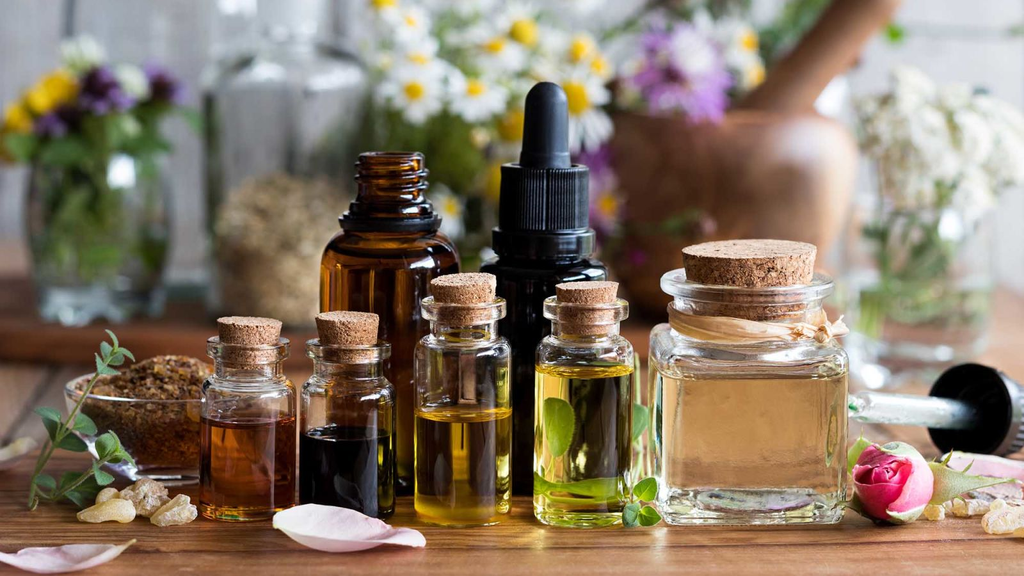January 25, 2019

Sometimes, essential oils take most of the limelight overshadowing an equally important counterpart in any blend, which is the carrier oils. Carrier oils may be called as such because they "carry" the essential oils but they do have a lot of therapeutic value to offer. Carrier oils are said to have a "fixed nature", meaning that they are stable and have a slow evaporation rate as compared to essential oils which are "volatile" and are known to have high evaporation rate.
Carrier oils typically make up 95% to even 98% of any oil blend. They are normally used to dilute essential oils so that the essential oils are safer for topical usage. Essential oils are extremely potent, so it is only necessary to use them in very small quantities (2 - 5% dilution) in order to enjoy their benefits.
Carrier oils allow you to cover a larger surface area of your body with essential oils and with the proper dilution, the blend will reduce the chances of causing adverse skin reactions. Using carrier oils is especially important when one is applying essential oils on children or to areas with sensitive skin, or when looking to cover a large body area with essential oils.

Therapeutic aromatherapy blending favours carrier oils which are extracted from vegetables, seeds and nuts. They are rich in nutrients, vitamins, and are soothing, nourishing and restorative to the skin.
Whenever possible, the best choices are always organic, cold pressed and/or unfiltered vegetable, seed, or nut oils as a carrier.
“Organic oil” signifies that the plant was grown without pesticides, herbicides, or fungicides, and was produced with no added synthetic chemicals. "Cold pressed" indicate that the oil has not been heated during extraction which helps the oil to retain a significant quality and quantity of its nutrients.
Using the highest quality of carrier oils makes a significant difference in the therapeutic quality and absorption. For this reason, animal, mineral, or synthetic oils are not used to make essential oil blends.

In Soap Artisan, our first choice is always cold pressed oils. However, we note that most of the oils still undergo a refining process which tends to create a product which is cleaner and more stable. As stability and consistency are important especially in a climate that is mostly warm and humid, most of our oils are refined. However, due to popular demand we do carry some virgin or unrefined oils which are higher in therapeutic value for making oil blends and balms:
We also offer hot-pressed refined coconut, palm and castor oils which are frequently in demand for soap making. We do not recommend using these oils in therapeutic aromatherapy blends. (Please note that we already have a cold-pressed castor oil and a fractionated coconut oil option).

Below is a chart with a quick description of most of our carrier oils along with suggested usage. As with all our products, you are recommended to test these products on your own to decide which ones works best for your formulations.
Oil Name |
Description |
Skin Type / Purpose |
|
Non-greasy and readily absorbed into skin. Rich in essential fatty acids like oleic and linoleic acid. Light in texture, almost odourless, highly penetrative. Suggested usage: Up to 100% in a blend |
Prematurely aged, dry or inflamed skin |
|
|
Reputed as one of the best oils from head to toe. Contains a lot of tocopherols (Vitamin E) that have been credited with the healing and skin regeneration process Suggested usage: Up to 100% in a blend |
Aged skin, acne, sunburns, skin with hyperpigmentation. Traditionally believed to lighten skin. Good choice for hair blends to calm frizzy hair and restore shine. |
|
|
Avocado oil is a rich heavy oil high in vitamins high in vitamins A, B, D, lecithin, potassium, proteins, and fatty acids. Has nourishing, softening, and restorative qualities Suggested usage: Up to 50% in a blend |
Dry, dehydrated, climate-parched, damaged, undernourished, or mature skin, eczema, diaper rash. |
|
|
Borage oil is found to have a high level of gamma- linolenic acid (GLA), an essential fatty acid which can help reduce inflammation and maintain healthy skin. Suggested usage: Up to 5 – 25% in a blend |
Good choice for face oil blends, prematurely aged skin, psoriasis and eczema. Also good in blends for PMS, menstrual complaints, arthritis and other inflammatory conditions. |
|
|
Viscous oil with antifungal and anti-inflammatory properties. Studies have shown that when castor oil is applied topically, it can help to reduce inflammation and pain. It also improves lymphatic circulation within in body. Suggested usage: Best used in a warm compress to relieve pain and inflammation. However, depending on usage, some recipes are known to use castor oil 100% or in equal parts with other carrier oils. |
Can be used to soften skin warts, skin tags and on cracked heels. Good choice for blends to relieve joint pain, arthritis, muscle or back soreness, nerve inflammation or sports injuries. Good choice for blends to aid treatment of common fungal diseases like athlete’s foot and ringworms. |
|
|
A light, non-greasy and non-staining oil that is easily absorbed into skin. Fractionation is a process that uses heat to separate the oil into its components—in this case, to contain only the capric and caprylic triglycerides. Contains anti-bacterial, anti-viral, anti-fungal and anti-inflammatory properties. Suggested usage: Up to 100% in a blend |
Incorporate as base oil for blends with anti-bacterial and anti-fungal properties. Consider this oil for those who are looking for a “less greasy” oil. |
|
|
Like borage it is rich in gamma-linolenic acid (GLA). EPO has antioxidant, anti-inflammatory and free radical scavenging capabilities. Suggested usage: 5 – 25%in a blend |
Scaly, dry, itchy and eczema-prone skin. Use in blends for PMS, menstrual discomfort and rheumatoid arthritis |
|
|
A very light oil. High in polyunsaturates, vitamin E, minerals, protein, and traces of pycnogenol, which is a free radical scavenger with antioxidant qualities. Not only does regular use of grapeseed oil make the skin soft and supple but it also strengthens and fortifies the skin. Suggested usage: Up to 100% in a blend |
All skin types, including oily skin. |
|
|
High Vitamin E content and is absorbed quickly by the skin, offering softening and is also slightly astringent in action. It has a high vitamin, mineral, and protein content and is useful in applications of imbalanced skin, like acne. Suggested usage: Up to 100% in a blend |
All skin types, including oily skin. |
|
|
Serves as a good moisturizer as it is non-greasy, non-allergenic and non-comedogenic (does not clog pores). The oil is actually a liquid wax with a chemical composition that is very close to oil in our own skin. Suggested usage: 5-15% in a blend. Can be used up to 100% in aromatherapy perfumery. |
All skin types. Good choice for sensitive skin. |
|
|
One of the highest sources of palmitoleic acid (a mono-unsaturated fatty acid) which delays premature aging. Highly nourishing and emollient, good for dry mature skin. Suggested usage: 5 – 25% in a blend |
Dry and mature skin. Good choice for anti-aging oil blends. |
|
|
Has antibacterial and anti-inflammatory properties to reduce swelling. Also contains natural pesticide and germicide properties - it can be used as a natural insect repellent. Has strong smell, one may wish to mix it with other oils. Suggested usage: 1 – 5% in a blend, or lightly dab some undiluted oil on affected area |
Good choice in blends for fungal infections and acne. |
|
|
Clinical work done in South America claims that rosehip oil is extremely beneficial in skin repair and tissue regeneration. It is believed that these important are due to high levels of both gamma-linolenic acid (47.4%) and linolenic fatty acids (33%). Suggested usage: 5 -25% in a blend |
Dry skin and mature skin. Good choice for regenerative blends to soften facial wrinkles, support healing of burns and wounds and treatment on scars following surgery. |
|
|
Sweet almond oil is non-greasy and readily absorbed into the skin. A mild and gentle oil. Suitable for young children. Contains Vitamins B1, B2, B6, and E. Suggested usage: Up to 100% in a blend |
Chapped, dry, flaking and itchy skin |
|
|
Rich and thick but easily absorbed. Has properties which are anti-inflammatory, analgesic and cicatrisant (helps with the renewal of cells and healing of skin). Suggested usage: 5 -25% in a blend |
Dry and irritated skin. Good for regenerative blends to repair and diminish redness, scars, stretch marks, itchiness and peeling. |
|
|
Rich and thick oil. It has a high content of Vitamin E. Its regenerative properties helps promotes skin elasticity, formation of skin cells and helps relieves symptoms of dermatitis. Suggested usage: 5 -10% in a blend |
All skin types Do not use in blend if there is an allergy to wheat.
|
Comments will be approved before showing up.